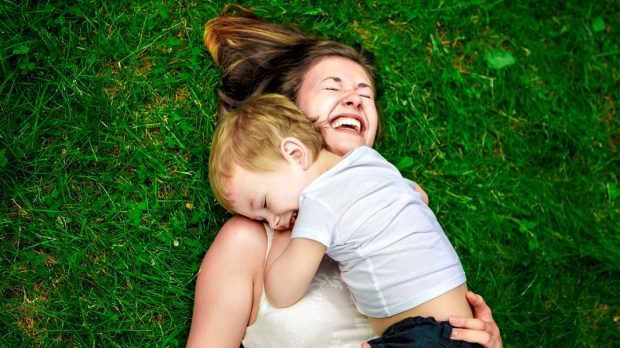Lenten Campaign 2025
This content is free of charge, as are all our articles.
Support us with a donation that is tax-deductible and enable us to continue to reach millions of readers.
After my fourth baby was born, I got hit with bad postpartum depression. Life lost all its color, and even things I always loved, like reading, seemed pointless. When I wasn’t crying, I would sit on the couch and stare out the window for hours without seeing anything.
One day, my husband tried a new tactic. He made me get dressed and and go to the park with him and the kids, and then he announced to the kids that I wanted to play lava tag with them.

Read more:
Stop the early reading madness and let kids play
I did not want to play lava tag with them. I didn’t know what lava tag was, and I didn’t care. But their faces lit up and they whooped and cheered, because it had been so long since I’d played anything with them. I knew I shouldn’t disappoint them, so I shot a venomous glare at my husband before resignedly listening to the rules of the game.
It was complicated, like every game they invent, and involved lots of jumping across playground equipment to avoid the mulch “lava” — but sometimes what you were standing on would sink, and you’d have to climb, or swing, or hang.
I died several fiery deaths before I got the hang of it. I was so sweaty and out of shape that I couldn’t hold onto anything for long. But when I jumped off a sinking log and managed to grab the monkey bars and hang on, I felt a shock of exultation and smiled — a real, genuine smile. It felt strange and unfamiliar to smile. It felt strange and unfamiliar to feel, period.
I learned a lesson that day that researchers have known for years: play is as essential for adults as it is for kids. There’s even a National Institute for Play in California, founded by psychiatrist Stuart Brown. He recently explained to the Washington Post just how important playing is for adults:
“Play is a basic human need as essential to our well-being as sleep, so when we’re low on play, our minds and bodies notice,” Brown says. Over time, he says, play deprivation can reveal itself in certain patterns of behavior: We might get cranky, rigid, feel stuck in a rut or feel victimized by life.
You don’t have to go play lava tag at a playground, though. For adults, just like for kids, playing can take all kinds of forms. Dr. Brown suggests thinking back to your childhood and remembering what kind of play you chose then, and finding a similar outlet now.
All play is not equal — my husband loved Legos as a kid, and enjoys spreading them out on the floor and spending an afternoon building with the kids. I did not like Legos, or any type of building toy, and I break out in hives when the kids want me to help them build a Lego project. They’ve learned not to ask me, actually, because I usually end up crying and having to go outside and swing until I calm down.

Read more:
How nature can help your child get closer to God
I loved being outside as a kid, and spent hours on our trampoline. When I got tired of jumping I would stretch out on the canvas and read or nap.
As an adult, I know that my stress level will instantly recede once I get outside into the sunshine. In fact, going more than a day without sun and exercise is enough to make me feel bleak and sad. A week of it, and I’m headed for serious depression.
According to Dr. Brown, what all play has in common is “that it offers a sense of engagement and pleasure, takes the player out of a sense of time and place, and the experience of doing it is more important than the outcome.”
Whether that’s painting, running, or playing a board game, you need to make time for it. It isn’t a leisure activity, it’s an essential part of your health and well-being. Everything else you do, from work to sleep, will be improved by adding some playtime to your day.

